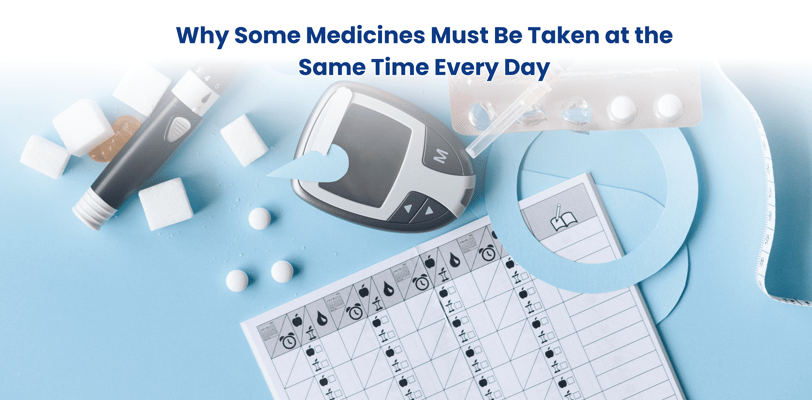Why Some Medicines Must Be Taken at the Same Time Every Day
When your doctor or pharmacist tells you to take your medicine at the same time every day, it’s not just a random suggestion — it’s a crucial part of your treatment plan. Whether it’s for blood pressure, diabetes, infections, or mental health, taking your medication consistently helps ensure it works effectively and keeps you healthy. In this blog, we’ll explain why timing matters, how consistency affects your health, and simple tips to stick to a medication schedule.
3/4/20252 min read


🕒 Why Timing Matters for Medicines
Many medications work best when they are kept at a steady level in your body. This constant level helps the medicine do its job — whether it’s controlling symptoms, killing bacteria, or balancing hormones.
🔹 Missing doses or taking medicine at different times can make the drug less effective.
🔹 Some medications need to be taken at a specific time to match your body’s natural rhythms — for example, cholesterol medications often work better when taken at night.
🔹 Certain antibiotics must be taken at precise intervals to fight off bacteria effectively.
💊 Examples of Medications That Require Consistent Timing
1️⃣ Blood Pressure Medicines
These help control blood pressure throughout the day, so skipping or delaying doses can lead to spikes or drops in your blood pressure.
2️⃣ Birth Control Pills
For oral contraceptives, timing is critical. Taking them at the same time every day ensures their effectiveness at preventing pregnancy.
3️⃣ Diabetes Medications
Drugs like insulin or oral antidiabetics need to align with meals and blood sugar levels. Skipping doses can lead to dangerous spikes or crashes.
4️⃣ Antibiotics
To completely clear an infection, antibiotics must be taken at regular intervals to keep a steady level in the bloodstream. Inconsistent use can also lead to antibiotic resistance.
5️⃣ Mental Health Medications
Medications for anxiety, depression, or bipolar disorder need consistent levels to stabilize mood and prevent symptoms from returning.
📊 What Happens When You’re Inconsistent?
Skipping or delaying doses can have serious consequences:
✔ Reduced effectiveness — Your condition may not improve or could get worse.
✔ Increased side effects — Irregular levels in your system can trigger unwanted reactions.
✔ Development of resistance — Inconsistent antibiotic use can make bacteria resistant, making infections harder to treat.
✔ Withdrawal symptoms — Medications for mental health or chronic pain can cause unpleasant withdrawal effects if doses are missed.
📝 Tips to Stay on Track with Your Medication Schedule
✔ Set Daily Reminders – Use phone alarms or medication apps to remind you.
✔ Link It to a Daily Habit – Take your medication right after brushing your teeth or during meals.
✔ Use a Pill Organizer – This helps you see if you’ve missed a dose.
✔ Keep Medications Visible – Place them somewhere you’ll see them every day, like next to your toothbrush.
✔ Ask for Help – Family members or caregivers can help remind you.
🔔 What to Do If You Miss a Dose
If you forget to take your medicine:
✔ Check the instructions – Some medicines can be taken a little late, while others should be skipped until the next dose.
✔ Don’t Double Up – Unless your doctor advises, never take two doses to “catch up”.
✔ Talk to Your Doctor – If you miss doses often, they can help adjust your schedule or suggest alternative options.
✅ The Bottom Line
Taking your medicine at the same time every day is more than just a habit — it’s a key part of getting better, staying healthy, and preventing complications. Whether you’re treating a short-term illness or managing a lifelong condition, consistency is the key to success.
💊 Stay consistent, stay healthy!
